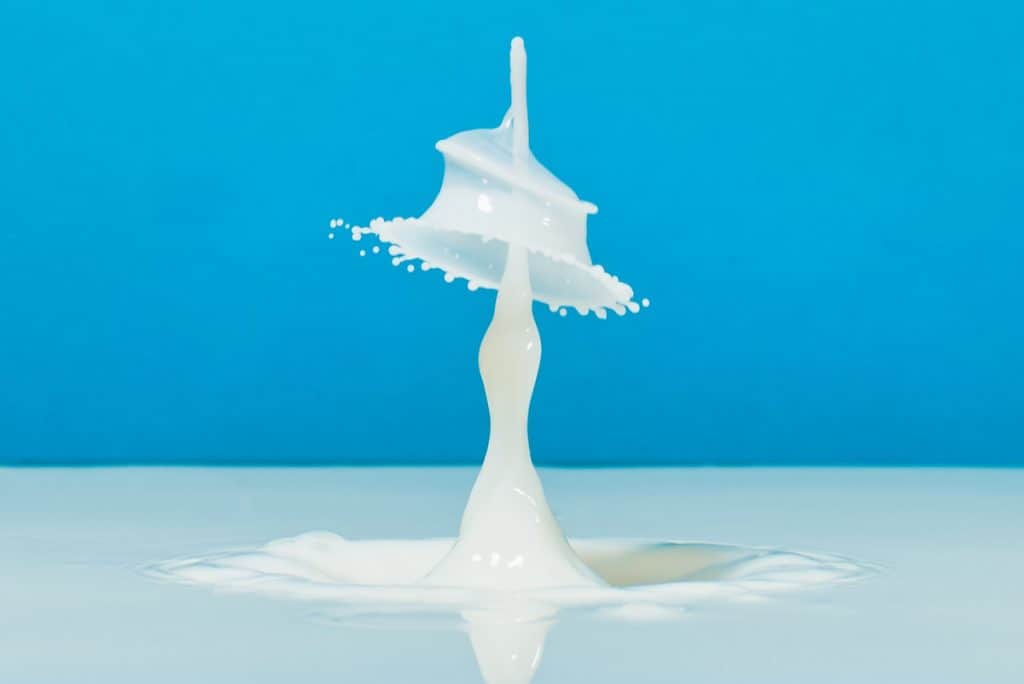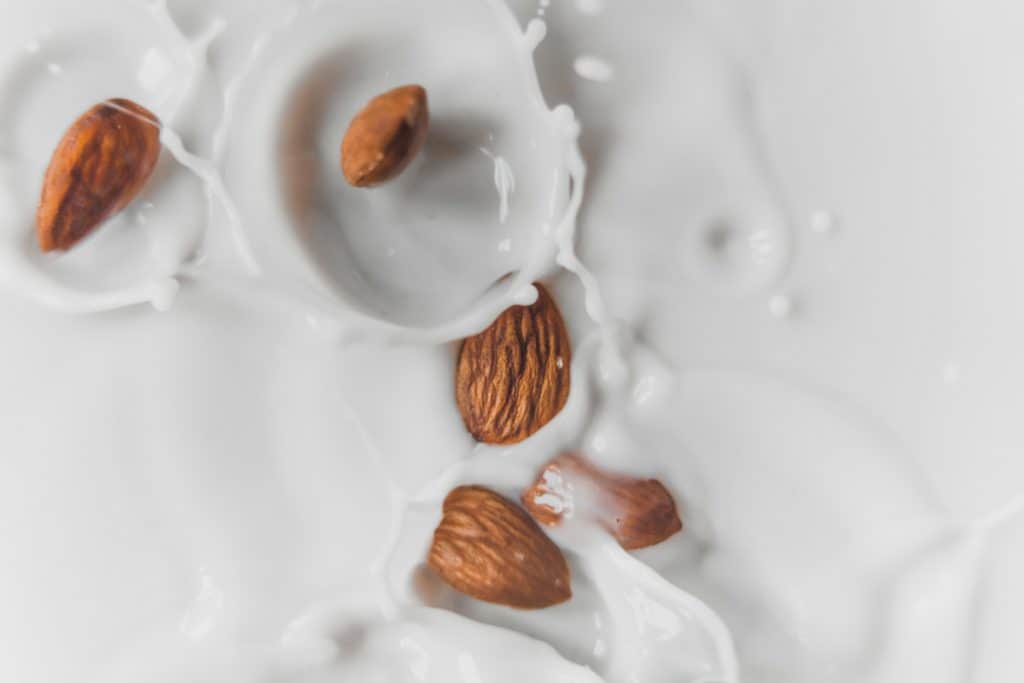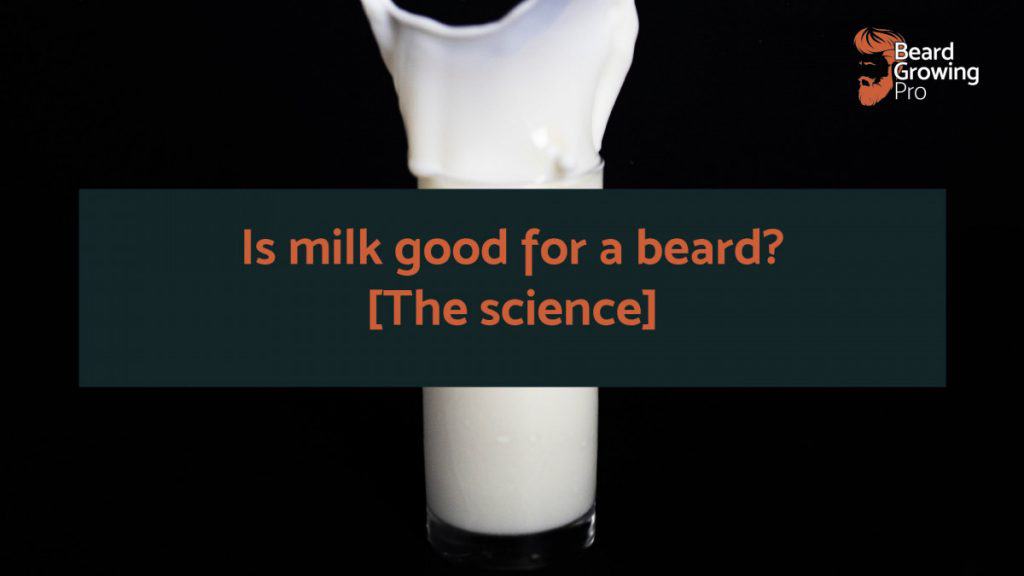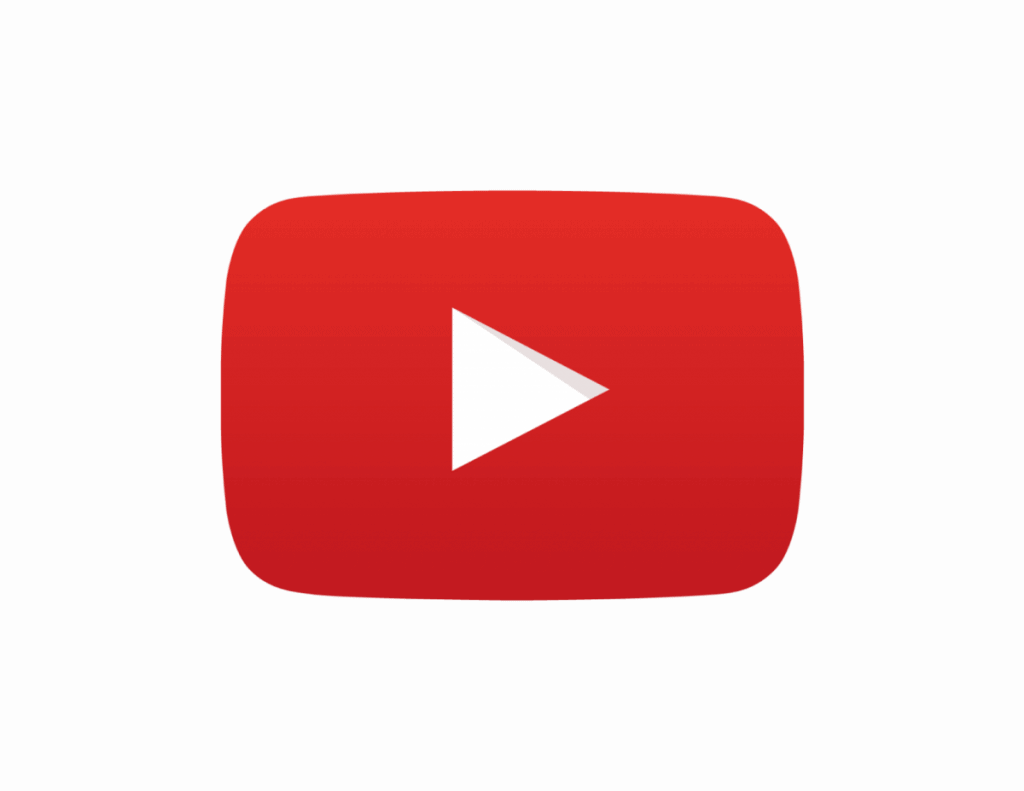Providing your body with the best essential nutrients and energy for growing a beard is very important. Making sure that you get a wide variety of foods in your body means your beard has the potential to grow thicker, longer, and fuller. However, some foods are better than others. In other articles, I have talked about eggs, coffee, and even sperm. In this article, I will talk about whether or not milk is good for your beard.
The essential nutrients in milk help your body produce testosterone and help your beard grow stronger and fuller. The topical application of milk can also soothe and condition dry and frizzy beard hair by absorbing fats and amino acids.
The production of milk by mammals is highly complex and of ancient evolutionary origin. Not all milk is created equally. Milk from different animals varies in composition. For example, there is hardly any fat in rhino milk, whereas, in ice breeding seals, there is up to 60% fat. Different animals contain unique proteins, but the major milk constituents are found across a spectrum of mammals.
In this article, we will focus on milk from a cow, but there are also other types of milk consumed by humans, such as buffalo milk, soy milk, breast milk, and any other type of milk.
Essential nutrients
Milk may be good for your beard because it provides your body with a whole range of essential nutrients. Milk is considered a whole food because it contains 18 out of 22 essential nutrients for your body to perform at its best.
Milk contains calcium, phosphorus, and vitamin D, which is especially important for your skeleton. Milk also contains iron, selenium, vitamin E, vitamin K, niacin, thiamine, and riboflavin.
There is no doubt that essential nutrients such as these will help your body produce a much stronger beard. But do they help with beard growth?
| vitamin D | In 2007, a study looked into the role of vitamin D in hair follicle biology. This study isn’t specifically to do with the beard, but it may indicate how to create healthy hair regardless of where it is on the body – and that can include your beard. So that makes it important to understand. |
| calcium | A research study found that calcium supplementation can help boost testosterone in combination with resistance training. |
| phosphorus | There is no evidence to suggest that phosphorus can help you grow a beard or improve your testosterone. |
| iron | Iron is an important micronutrient and is one of the most vital for supporting biological activities. There is a hormone called Hepcidin which decreases in response to low body stores of our own. This hormone helps increase iron absorption from food. Testosterone reduces Hepcidin which means that more iron is absorbed. |
| Selenium | Selenium helps in many functions within the body, including the creation of enzymes that testosterone production. Selenium has a positive impact on testosterone production. It has been shown to increase the testosterone levels of men aged 30 and over. |
| Vitamin E | Vitamin E plays an important role in the production of testosterone, and it has powerful antioxidant properties. The more vitamin E we consume, the higher our testosterone levels. |
| Vitamin K | Science has shown that testosterone levels are significantly reduced in a vitamin K restricted diet experiment. Getting a sufficient amount of vitamin K into your body helps produce testosterone. |
| Niacin | There is no clinical evidence to suggest that niacin may affect testosterone levels. There has been only one study that reported high doses of niacin could improve testicular function in rats. |
| Thiamine (B1) | Little research has been done on the vitamins, but thiamine affects the neurological system and may hinder testosterone uptake when the body is deficient. Drinking a little bit of milk clearly will help your body produce testosterone. |
| Riboflavin | In 1990, a study showed that riboflavin was an inhibitor of testosterone five alpha-reductase. |
As you can see from the table above, most of these essential nutrients can impact testosterone, which can also impact your beard growth. For a large part, milk seems to be a beneficial component for beard growth since it can provide several beneficial elements for testosterone production. It is only riboflavin that could inhibit the production of testosterone.
The main components of milk
Other than the essential elements, many components are unique to milk. These components include Caseins, fat milk globule, milk sugar, and amino acid from way protein.

Caseins
Caseins are unique to milk and provide a large portion of the amino acids required by offspring. These molecules aggregate into large balls in the water, which bind with calcium, delivering high calcium effects.
All calcium milk has been shown to contain alpha, beta and kappa-caseins.
This molecule has been proven to help boost protein metabolism, and also it helps the body repair and regenerate protein cells overnight. Another awesome effect if you are looking to grow a healthy beard.
Milk fat globule
an essential feature of milk is that it supplies energy-containing substrates to developing offspring. Mammals vary tremendously in the fat content of the milk from less than 1% up to 60% in some seals.
Milk fat globule is our fat spheres that float freely in the milk. These fat spheres can help condition the hair when applied topically by conditioning dry and frizzy beards. The cream in the milk helps soothe the hair cuticles and moisturises the beard strands.
You can mix milk with olive oil, avocado, or bananas to revive a dull, dry, and frizzy beard. Creating a banana, honey, and milk beard mask will help it look much softer and shinier.
Use as follows:
- take two ripe bananas and mix with about half a cup of honey and milk.
- Place the banana and honey mix in a blender – alternatively, you can’t mash it together with a fork until smooth.
- Make sure that the honey is warm as it will not mix well if left cold.
- Apply the mixture to your beard, making sure that you work it into the roots through the tips. I recommend you do this over a sink or in the bathtub.
- Cover your beard with a beard wrap and let the banana mask sit on your face for at least 20 minutes.
- Then, wash and condition your hair as normal – with or without shampoo. You can repeat this as often as you want. If you find that you are having a problem removing the honey, increase the temperature of the water.
Amino Acids
The major protein found in dairy animals such as dairy cattle, goats, sheep, and water buffalo is β-Lactoglobulin. This protein doesn’t have any biological role beyond supplying amino acids to the offspring. It will not help your beard grow. And topical treatment of this protein is unlikely to help your beard.
What type of milk
There is growing scepticism about the role of dairy products in adverse health effects in humans. There is an increased intake of plant-based milk such as soy milk, rice milk, arm and milk, and oat milk
The milk composition varies greatly depending on whether or not you are consuming cow milk, breast milk, soy milk, or other milk.
Cow milk
Cow milk has been shown to improve body composition and facilitate weight loss during restricted calorie diets. Milk also reduces the prevalence of type II diabetes and reduces the risk of cardiovascular disease, particularly stroke.
However, there is the potential of cow milk to expose us to oestrogen. A study published in 2010 looked at modern genetically improved dairy cows. Because dairy cows are kept pregnant throughout much of the milking cycle, their milk contains large amounts of oestrogen and progesterone.
The research is subjected seven men, six children, and five women to cow milk. They found that testosterone significantly decreased in men who were drinking the milk from pregnant cows.
Therefore, consuming a lot of cow milk could impact the amount of testosterone in your body and affect the androgen hairs growing on your body.
Soy milk

Soy protein contains many antioxidant factors which can help prevent heart disease and cancer. However, you may have heard that soy protein lowers testosterone levels. A study in 2005 found that in men, a four-week intake of high soy protein did not affect their testosterone levels.
Therefore, you do not need to be scared that soy milk or soy protein affects your testosterone level. However, soy milk does not contain all of the extra essential nutrients and minerals that you can find in cow’s milk. All of the essential minerals that are reported above help the body produce testosterone and operate efficiently. If you are only consuming soy milk, you may want to consider other options for obtaining other essential minerals through other whole foods.
Other beneficial foods
There are also plenty of beneficial nutrients in these foods for growing your beard:
- Berries and citrus – vitamin C is a very strong antioxidant and can be found in berries, oranges, kiwi fruits, and strawberries. Vitamin C can protect the beard follicle against damage from free radicals in the body. Vitamin C is also used to produce collagen for your hair.
- Spinach and kale – spinach and kale contain vitamin C and vitamin A. It helps the glands in the face produce sebum. Sebum is an oil produced by your face to keep the hair and the skin well-conditioned. As your beard gets longer see them will become very important in keeping it conditioned.
- Fatty fish – some types of fatty fish contain a huge amount of omega-three fatty acids. Omega-three fatty acids can promote hair growth in tuna, salmon, sardines, mackerel, trout, and other fish.
- Avocados – Avocados are delicious and a wicked source of healthy fats. They contain a huge amount of vitamin E, which, like vitamin A, helps combat oxidative stress caused by free radicals in the body. One study resulted in people with hair loss seeing 34.5% more hair growth after taking Vitamin E for eight months.
- Nuts and seeds – Almonds and sunflower seeds are a delicious way to boost nutrients to your meals. Nuts and seeds contain vitamin B, vitamin A, zinc, selenium, and omega-three fatty acids
Is milk good for a beard? Summary
In this article, we have been through everything you need to know about whether or not milk is good for a beard.
Applying the milk topically to a beard can be used for a deep hydration treatment as the facts penetrate deeply into the hair.
Consuming milk provides several essential minerals to your diet, and they have been known to help increase the body’s potential to produce testosterone. There are also many other beneficial effects such as weight loss, heart health, diabetes prevention, and appetite control.
Adding milk to your diet may be a fantastic way to help boost your beard growing potential.



